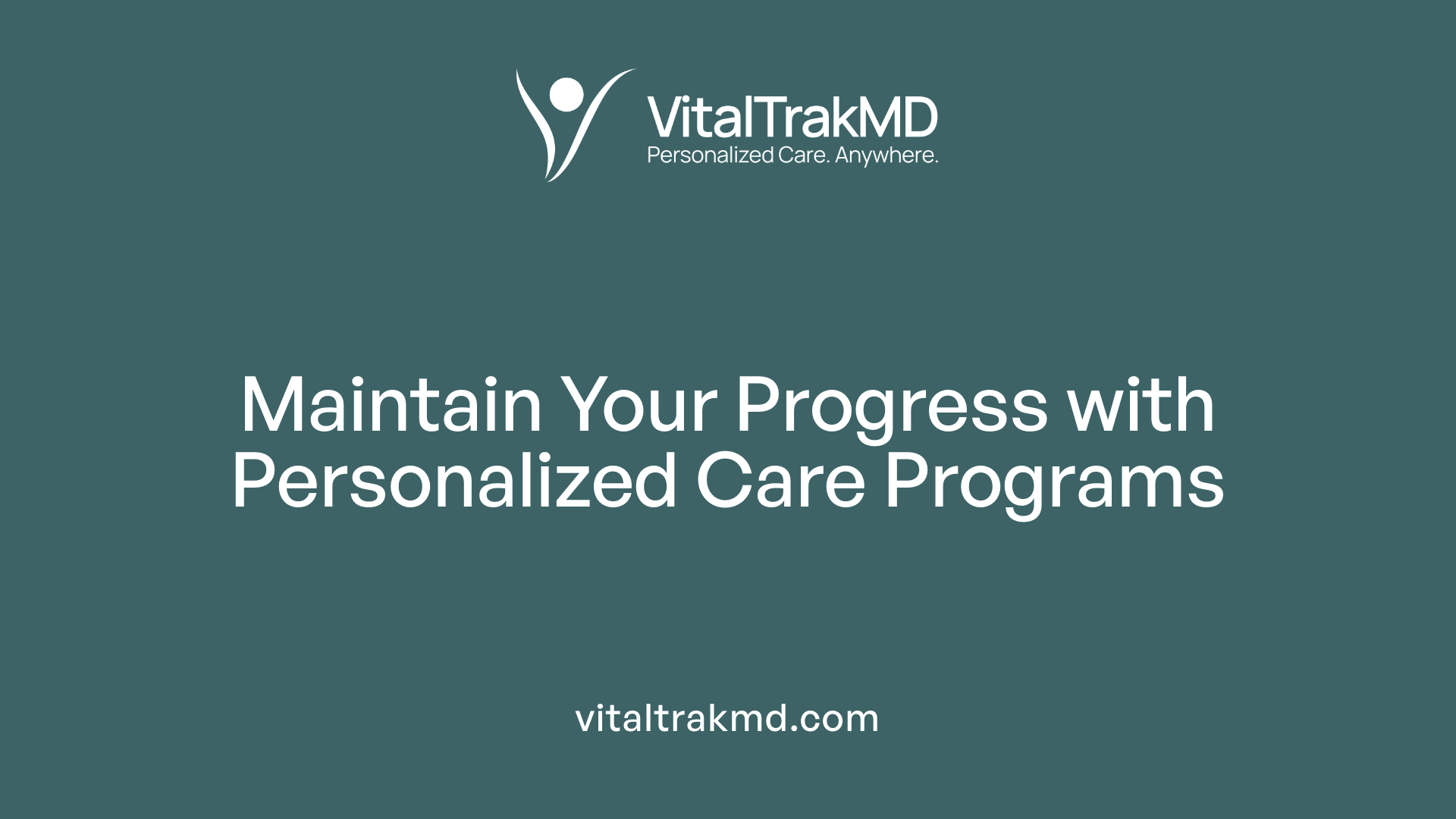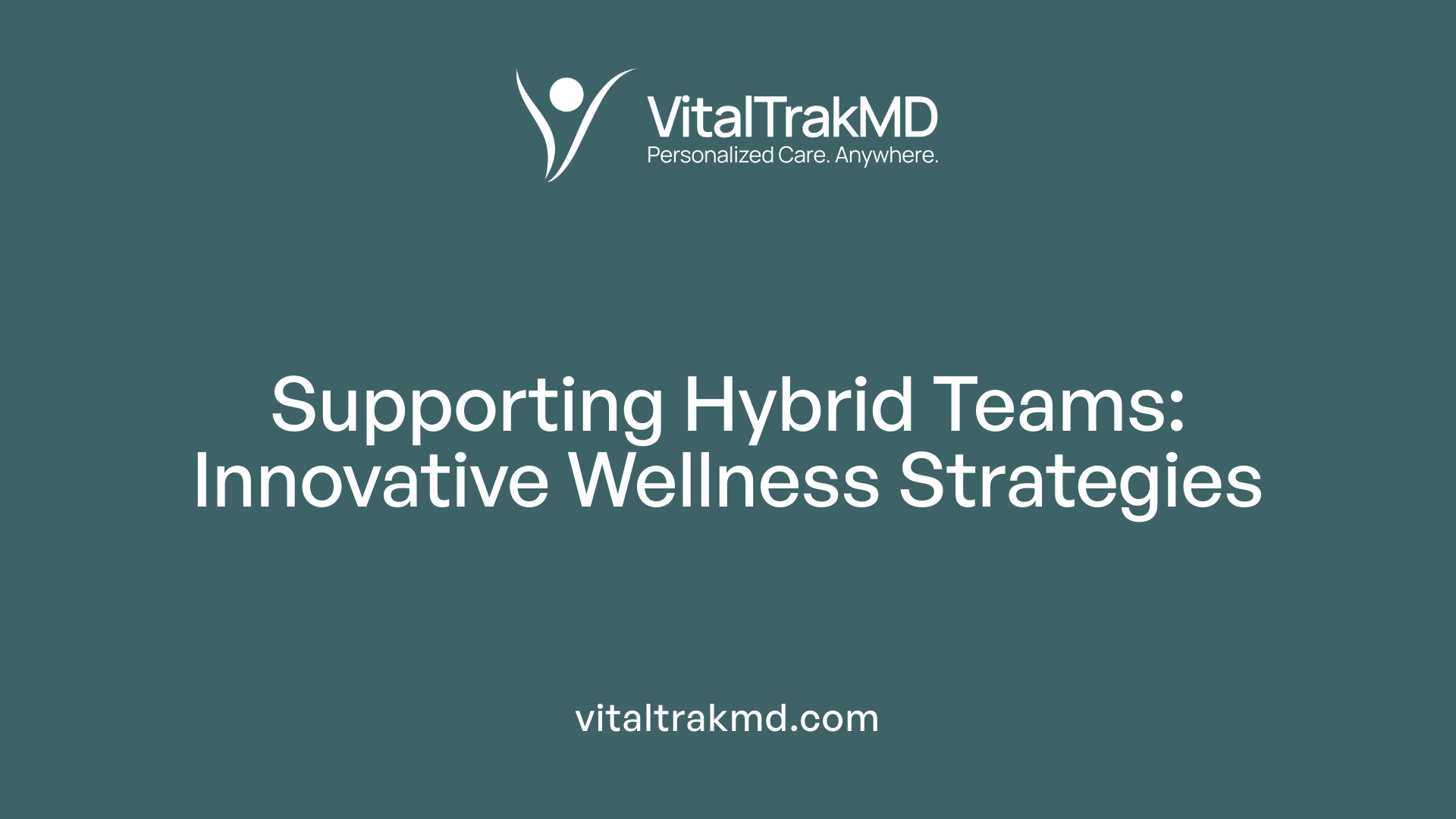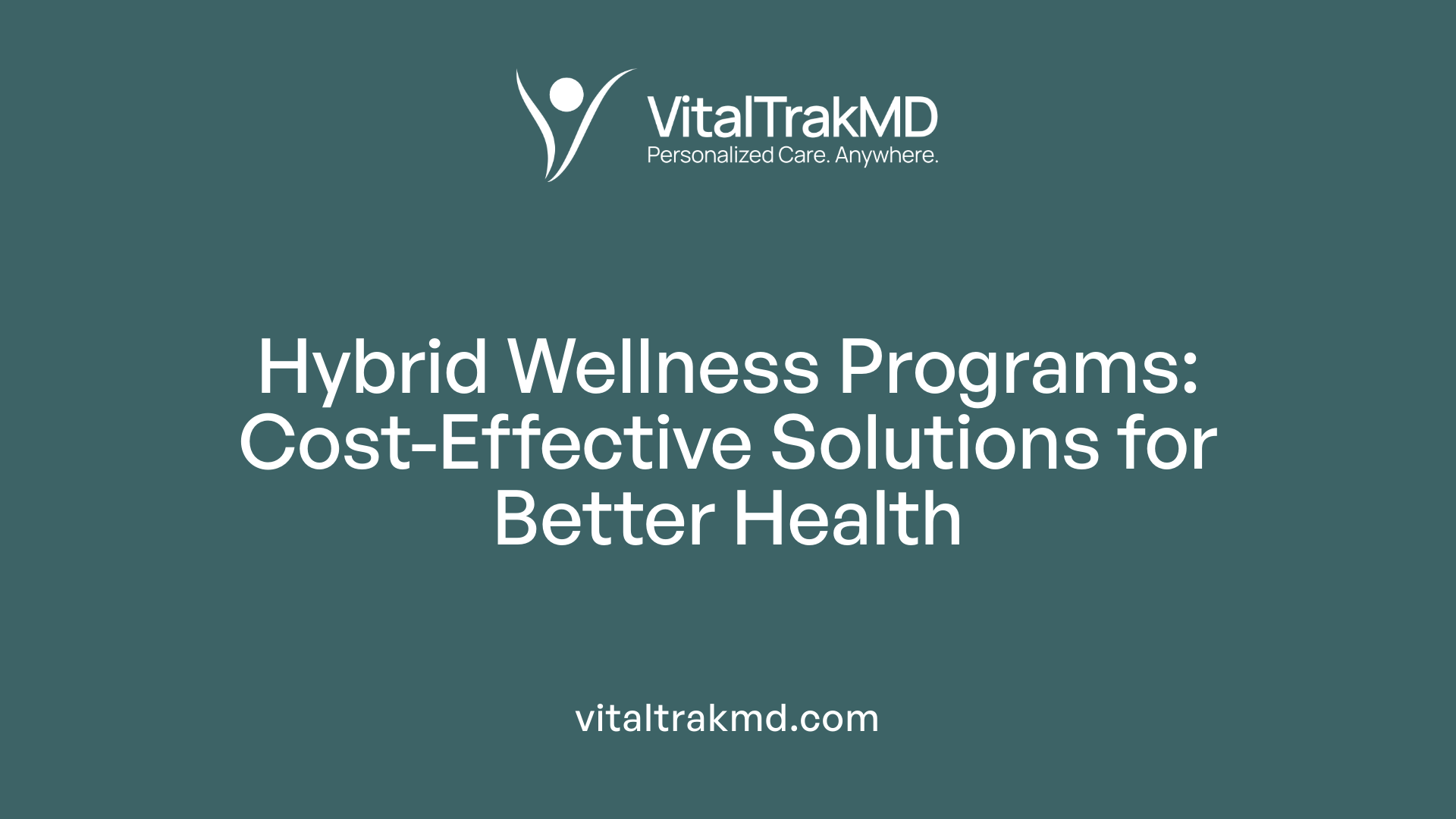How Hybrid Programs Reinforce the Importance of Self-Care

Introducing the Rise of Hybrid Self-Care Programs
As the landscape of healthcare and workplace wellness evolves, hybrid self-care programs that combine digital tools with personal coaching are proving essential in promoting and sustaining positive health behaviors. These programs integrate tailored education, behavioral strategies, and ongoing support to reinforce the importance of self-care, particularly for individuals managing chronic conditions and for employees navigating the challenges of hybrid work environments.
Transforming Nutritional Self-Care through Hybrid Education

How Does the Integration of the Teach-Back Method with Digital Education Enhance Nutritional Self-Care?
Integrating the Teach-Back method with digital education forms a dynamic hybrid self-care program, especially effective for patients managing chronic conditions. The Teach-Back method ensures patients fully understand nutritional guidance by having them explain it back to educators, reinforcing comprehension and retention. When combined with accessible digital tools, this method supports ongoing education beyond clinical visits, facilitating continuous learning and engagement.
What Impact Does This Hybrid Program Have on Dietary Habits and Nutrition?
This hybrid education model significantly improves dietary habits and nutritional self-care. Data shows a marked reduction in the proportion of individuals with unhealthy diets from 98.67% to 49.34%. Simultaneously, adherence to healthy diets increased from 0% to 13.33%, indicating meaningful dietary shifts. The hybrid program helps patients make informed dietary choices, promoting healthier eating patterns vital in managing chronic diseases.
Are Long-Term Improvements Evident in Self-Care Scores and Diet Quality?
Yes. Nutritional self-care scores exhibited sustained improvement from baseline through 3 and 12 months post-intervention. Such lasting enhancements highlight the effectiveness of continuous education combined with the Teach-Back method. Maintaining improved self-care practices over extended periods is crucial for chronic condition management, and the hybrid program supports these sustained behavior changes.
How Does the Program Influence Cardiovascular Risk Factors?
At the 12-month follow-up, patients participating in the hybrid program demonstrated significant reductions in cardiovascular risk markers. These included decreases in systolic and diastolic blood pressure, fasting blood glucose levels, and body mass index (BMI). These improvements underscore that nutritional education paired with ongoing support can contribute significantly to reducing risks associated with chronic cardiac and metabolic conditions.
What Role Does Mental Health Play in Wellness and Weight Loss Initiatives?
Mental health is central to the success of wellness and weight loss efforts. Psychological well-being affects motivation, emotional regulation, and the ability to adhere to lifestyle changes. Challenges such as anxiety, depression, or low self-esteem often hinder progress through emotional eating or reduced commitment. Integrating mental health support, including stress management and fostering a positive mindset, enhances sustainability and overall wellness outcomes in hybrid self-care interventions.
Effective Wellness Programs for Weight Loss: A Holistic Approach

What Are the Most Effective Wellness Programs for Weight Loss?
Effective wellness programs for weight loss are comprehensive and focus on more than just dieting. They integrate balanced nutrition and consistent physical activity tailored to individual needs, ensuring changes are sustainable rather than drastic.
Balanced Nutrition and Physical Activity
Balanced nutrition involves calorie-appropriate meals rich in whole foods, vegetables, lean proteins, and healthy fats. Physical activity, ranging from virtual fitness challenges to flexible on-demand workouts, supports calorie expenditure and overall health.
Behavioral Strategies and Stress Management
Behavioral techniques such as setting SMART (Specific, Measurable, Achievable, Relevant, Time-bound) goals and employing ongoing self-monitoring help cement new habits. Stress management is equally important, with tools addressing mental health issues like anxiety and fatigue contributing to improved adherence and reduced burnout.
Diet Plans Complementing Weight Loss
Popular dietary approaches that complement wellness programs include the Mediterranean diet, DASH diet, plant-based diets, intermittent fasting, and low-carb diets. These offer a range of options that align with personal preferences and health conditions.
Importance of Professional Support and Habit Formation
Professional support, including digital and human coaching, enhances personalization and effectiveness. Combining virtual education methods, such as the Teach-Back method integrated with digital platforms, fosters long-term habit formation and nutritional self-care.
By embracing this holistic, adaptable approach, wellness programs can achieve sustainable weight loss while supporting overall physical and mental well-being.
Sustaining Weight Management: The Vital Role of Care Programs

How do care programs support long-term weight management?
Care programs play an essential role in helping individuals maintain healthy weight over time. They offer personalized guidance on nutrition and physical activity, allowing patients to adopt balanced diets and regular exercise tailored to their unique needs. This personalized approach not only promotes healthier behaviors but also improves diet quality and nutritional self-care.
Beyond initial education, care programs emphasize ongoing monitoring and motivation. With continued follow-up and support, patients can track their progress, adjust goals, and stay committed to lifestyle changes. Long-term interventions have been shown to significantly reduce cardiovascular risk factors such as blood pressure, fasting glucose, and body mass index.
Emotional and mental health counseling is an integral part of comprehensive care programs. Addressing stress, anxiety, and other psychological barriers supports sustained behavior change. Counseling helps individuals cope with challenges that could otherwise lead to unhealthy habits or weight regain.
Social support systems form a vital backing within weight management programs. Community resources, group activities, and peer support networks create encouragement, reduce feelings of isolation, and foster accountability. These elements enhance patient engagement and the likelihood of lasting success.
In summary, combining personalized nutrition, continued motivation, mental health support, and strong social networks creates a holistic framework. This balanced approach effectively sustains weight management, reduces health risks, and enhances overall well-being.
Designing Workplace Wellness for Hybrid Teams: Addressing New Challenges

What Wellness Challenges Do Hybrid Work Environments Present?
Hybrid work models introduce unique wellness challenges, including social disconnection, increased screen fatigue, and scheduling difficulties. Employees working remotely or in mixed settings often face isolation from colleagues, which can deteriorate morale and mental health. Frequent use of digital communication tools also contributes to eye strain and exhaustion, complicating efforts to maintain work-life balance.
What Strategies Support Wellness in Hybrid Teams?
To tackle these issues, organizations are adopting several innovative wellness strategies:
- Virtual fitness challenges encourage physical activity through friendly competition accessible from any location.
- Mental health tools provide resources such as mindfulness apps and counseling services tailored to remote stressors.
- Flexible on-demand wellness options enable employees to engage in health programs at convenient times, accommodating diverse schedules.
- Community-building activities foster connections that reduce feelings of isolation and reinforce team cohesion.
How Do Wellness Programs Benefit Hybrid Workforce Engagement and Retention?
Implementing these wellness initiatives leads to numerous positive outcomes. They boost employee engagement by promoting a healthy, supportive culture that values well-being. Enhanced collaboration arises as teams connect through shared wellness activities, while reductions in burnout improve overall morale. Consequently, organizations experience improved retention rates as employees recognize the commitment to their health and work-life integration.
Why Are Leadership Participation and Inclusivity Vital?
The success of wellness programs heavily depends on active leadership involvement and fostering inclusivity. When leaders openly support and participate in wellness efforts, it signals organizational priority and encourages widespread adoption. Inclusive programs that address the diverse needs of a hybrid workforce ensure equitable access and engagement, reinforcing a culture of care and respect.
Integrating these approaches enables businesses to design effective wellness programs that meet the complex challenges posed by hybrid work, ultimately supporting healthier, happier, and more productive employees.
The Cost-Effectiveness and Impact of Hybrid Wellness Programs

How Do Hybrid Wellness Programs Reduce Healthcare Costs and Absenteeism?
Hybrid wellness programs, combining virtual and in-person elements, play a pivotal role in reducing healthcare costs. By promoting healthier lifestyles, these programs address unhealthy habits like poor diet, stress, smoking, and inadequate sleep that contribute heavily to chronic conditions such as diabetes, heart failure, and obesity. Preventive health measures embedded in wellness offerings can lower the need for expensive medical treatments and reduce absenteeism caused by illness.
In What Ways Do These Programs Improve Employee Productivity?
Employees engaged in well-rounded wellness programs experience better physical and mental health, which translates into higher job satisfaction and improved competence. Programs addressing mental health concerns—like anxiety and fatigue—and promoting balanced nutrition and physical activity enhance long-term employee performance and productivity. Moreover, such initiatives foster a positive organizational culture, encouraging stronger collaboration and reducing burnout.
Why Are Digital and Human Coaching Effective in Supporting Hybrid Workers?
The integration of digital education with human coaching, particularly personalized approaches, significantly benefits hybrid and remote workers. This combination offers flexible, on-demand wellness resources and continuous follow-up that increase engagement and sustain behavior changes. Tailored coaching caters to individual needs, making it easier for employees to adopt and maintain healthy habits despite the unique challenges of hybrid work.
How Do Preventive Measures in Wellness Programs Promote Holistic Health?
Hybrid wellness programs extend beyond basic healthcare by incorporating stress management, healthy nutrition, physical activity, financial guidance, and community-building. These comprehensive efforts support both physical and mental well-being, addressing the range of health determinants holistically. As a result, employees are better equipped to manage chronic conditions or avoid them altogether, leading to enhanced overall health and workplace morale.
Empowering Health through Integrated Self-Care Solutions
Hybrid programs that blend personalized education, digital tools, and ongoing support demonstrate a powerful model for reinforcing the importance of self-care. By addressing nutrition, mental health, and lifestyle behaviors comprehensively and sustainably, these programs not only improve individual health outcomes but also enhance workplace wellness and reduce healthcare costs. As hybrid work models become the norm, adopting inclusive and flexible wellness initiatives will be essential in fostering healthier, more resilient communities and workforces.
References
- Sustainable effects of a hybrid self-care education program ...
- Winning Wellness Programs for Hybrid Teams
- The Importance of Wellness Programs in Modern Companies
- Remote & hybrid work is here to stay: should your wellness ...
- The Mayo Clinic Diet: A weight-loss program for life
- Choosing a Safe & Successful Weight-loss Program - NIDDK
- Steps for Losing Weight | Healthy Weight and Growth
- The 9 Best Diet Plans: Sustainability, Weight Loss, and More
- Choosing a Safe & Successful Weight-loss Program - NIDDK
Recent articles
Want to Feel Better and Live Healthier?
Join hundreds of patients taking control of their health with personalized care that fits their life – not the other way around.
Rated 4.8/5 by 32+ customers







